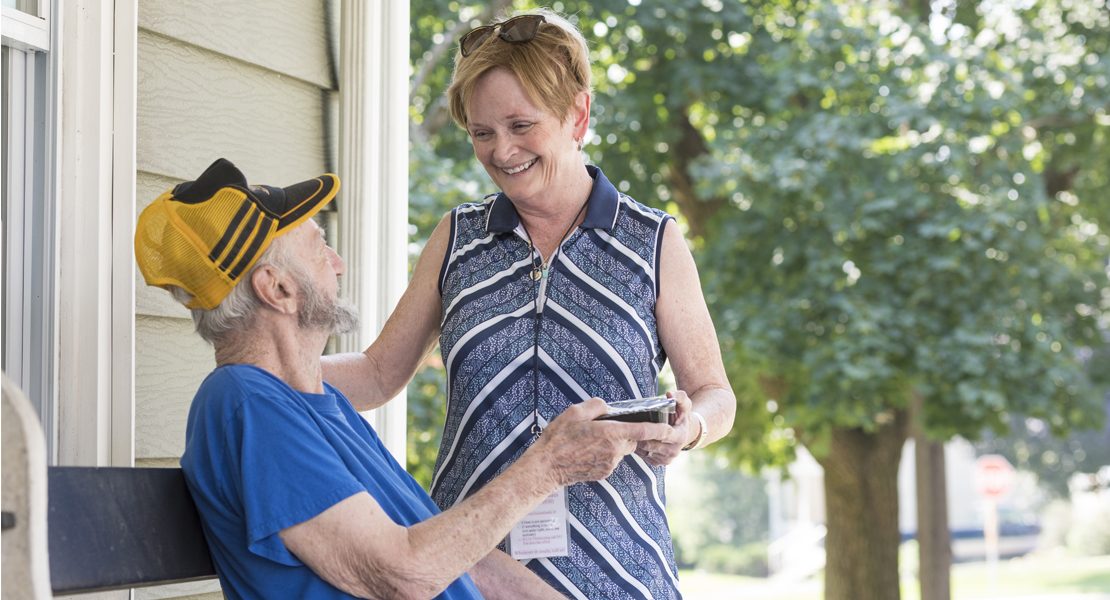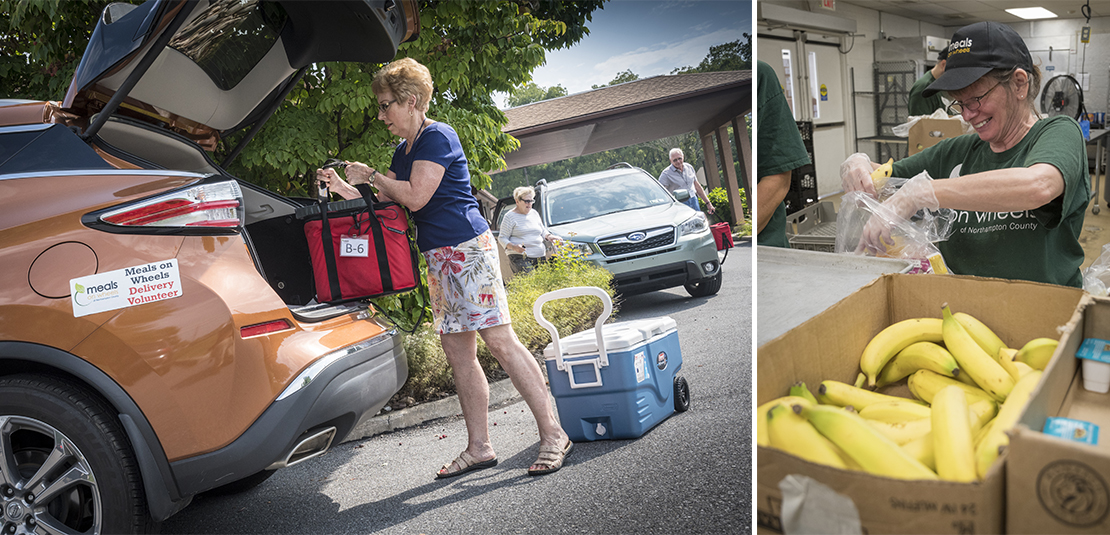Meals on Wheels

Thanksgiving Day is just a few weeks away, and we’re all anticipating a table loaded with enough food to feed an army. This time of year, it’s important to recognize that thousands of people in the Lehigh Valley won’t have that kind of meal.
Whether through age, infirmity, or economic situations, purchasing and cooking food for many presents challenges. Twelve hundred meals a day, 5 days a week along 84 delivery routes, Meals on Wheels of the Greater Lehigh Valley (MWGLV) fulfills its mission.
Until recently, our community was served by two separate groups –Meals on Wheels in Lehigh County and Meals on Wheels in Northampton County. Following the retirements of Lehigh’s executive director Pam Bechtel in 2017, and Northampton’s JoAnn Nenow in 2018, the organizations merged.
Both groups used the same business model and delivery structure. “Both boards recognized that a single organization could serve the Lehigh Valley with greater efficiency,” says Victoria Coyle, MWGLV’s chief executive officer. “I originally replaced JoAnn in Northampton. Over time, the boards collaborated and asked me to oversee the newly merged operation.”

Contrary to popular belief, Meals on Wheels is not a “program of last resort”. The majority of clients are in a low-income bracket and use the service for extended periods, but others are served for a short time. “On one hand, we may have someone who’s at home convalescing from surgery. On the other, an individual may need nutritional support longer term due to limited mobility or other factors,” Coyle explains.
Signing up for in-home meal delivery is a simple, straightforward process. Generally speaking, a concerned family member proactively contacts our office or clients call in themselves and self-refer. In either case, Meals on Wheels’ intake staff collects basic information over the phone. An in-home evaluation determines the level of need and other qualifying factors (physical condition, ability to manage daily tasks, and so on).
Overall, Meals on Wheels emphasizes healthful eating, and meals are designed by a licensed nutritionist. “Meals are customized to fit each individual’s particular needs. Clients with kidney disease need certain considerations, as do people with swallowing, or dentition issues,” Coyle says. “We can provide over 50 different accommodations in our basic meals.”
Although many other Meals on Wheels operations rely on vendors to supply pre-made frozen meals, MWGLV’s food is made fresh every day at its Bethlehem headquarters, which features complete kitchen facilities.
Kitchen staff arrives daily at 3:00 a.m. to begin preparation and cooking. Drivers get their orders and begin deliveries around 10 a.m. All of the side dishes are made in-house. If a vendor supplies meatloaf, for example, it’s delivered uncooked, portioned, and made to order the same day. “We use as much locally sourced food as possible and are also a member of Buy Fresh Buy Local of the Greater Lehigh Valley,” Coyle says. Meals are assembled, packed in trays, sealed, labeled, and transferred to insulated bags that maintain a 140° temperature.
Meal delivery also provides a bit of personal interaction for clients, helping to offset the effects of social isolation. “Medically, being alone can affect your health the way smoking 15 cigarettes a day could,” Coyle says. Drivers generally have the same routes each day and are alert to changes in a client’s condition or behavior. Their feedback to the MWGLV office often results in a follow-up call to a family member.
Speaking of “family members,” Meals on Wheels looks after companion animals as well. “Our ‘Ani-meals’ program provides pet food or cat litter to about 25 low-income clients each month. Having a pet can help you live longer, and we want to be sure our clients eat their full meals and not share them with a pet; that’s not good for either of them,” she says.
The organization offers a grocery shopping program where clients provide a detailed list that’s filled at a participating supermarket. Volunteers then pick up and deliver orders. The group also promotes completing 2020 census forms. “Many clients feel vulnerable, and may feel the form is a scam, or is asking for too much personal information. Our team reassures them, and even help with completing the forms when needed.”
Current staffing includes about 40 paid positions and over 1,500 volunteers. Meals on Wheels of the Greater Lehigh Valley is funded through the United Way, local government contracts, grants, and private donations. As our population grows, the organization continues to meet the needs of our community.
Unopened/unexpired pet food contributions are welcome. Learn more, donate, or volunteer at www.mowglv.org.













